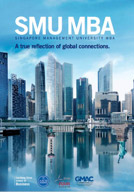
With many internships upended during this tumultuous period, many companies are now offering an alternative—the remote internship. Without the real-time back-and-forth of the office experience, does working from home put interns at a disadvantage?
Not necessarily, says Wendy How, Senior Manager at the SMU Dato’ Kho Hui Meng Career Centre. “Having an independent, careful and thoughtful mindset can help one do well in a remote internship. Young talents who show that they are willing to learn and committed to excellence are always sought after by companies.”
Here are some of her tips to making the most out of a remote internship.
1. Take ownership of your day
While most students feel that in-person time with supervisors and colleagues during an internship is a critical part of their learning experience, there are upsides to a remote internship. SMU Master of Business Administration (MBA) student Pansakarn Sukapong (Japan) found that she enjoyed the flexible workplace and having a hand in her own work-life balance during her internship at Unilever. “Many organisations today are trying to create a flexible work culture. Working remotely allows you to manage all 24 hours of your time, you don’t have to travel to the office, and instead can spend that time to enjoy breakfast or get some morning exercise.”
You also get a change in your work environment when you need it the most; be it for a burst of inspiration or just some peace and quiet. “I would visit a cafe to do my work on a day without formal meetings, it helps to reduce stress from work and boost my creativity. Especially when I need to work on presentations, working outside would provide some inspiration and brilliant ideas.”
“With the flexibility (and discipline) in your schedule, you will find yourself more productive at work, as well as the other parts of your life.”
2. Be more observant
Without in-person interactions, body language, intonations, and other visual and verbal cues may be harder to parse. To gauge the overall mood of meetings and your supervisor’s opinions, pay closer attention to the dynamics of online interactions.
To grasp the work culture of a company, also observe your supervisor’s and colleagues’ habits and routines. For instance, do they stop messaging and revert to email after work hours? Or do they continue communicating until a certain time? Try to model your own work habits during the internship after such prevailing norms.
3. Take a lot more initiative
Regardless of the nature of your internship, you must research the requirements and expectations of the posting carefully, and make sure you have the necessary skills and experience before applying.
Once you land an internship, double-check these expectations and requirements, and strive to adapt to changing needs and make it your goal to pick up new skills and knowledge swiftly. Be resourceful when it comes to learning on the job and take the initiative to ask your colleagues questions about key areas you want to know more about.
During this period of restructured working arrangements, it is likely that your colleagues have their hands full adjusting to the new normal. Instead of expecting your colleagues to correct your mistakes, be more meticulous about the standard of your work to show that you can be trusted to operate independently and productively.
“You must not be shy and be confident in speaking up. Regardless of small discussions or conference calls, it is important for you to speak up because your supervisor might use this to test your attentiveness” says Japan.
4. Respect the time and space of others
Mutual respect is the key to any successful professional relationship. When you are asking for feedback and guidance from your supervisors and colleagues, make sure you abide strictly by any time limits or scheduling constraints they may have.
In a larger meeting, introduce yourself and identify the department or team you are from when speaking for the first time. Wait for someone to finish his or her point before sharing yours. Alternatively, raise your hand to ask for a turn in the conversation.
As the boundaries between work and home life become more permeable, it is also important to be efficient in your working methods, to do your part towards preventing burn-out and to show respect for the private time of your co-workers. For example, send emails only when needed and keep them succinct. This will help to reduce email load for your team members.
Speak to our Admissions Advisors
Singapore Management University
Lee Kong Chian School of Business
Graduate Programmes Office, Level 4
50 Stamford Road, Singapore 178899
Tel: +65 6828 0882
Join us at the upcoming events
Via Gerolamo Cardano, 1, 20124 Milano MI, Italy
1 Raffles Drive, Makati Avenue, 1224, Makati City
Bayerstraße 41, 80335 München, Germany
You may also be interested in
Executive Master of Business Administration (EMBA)
